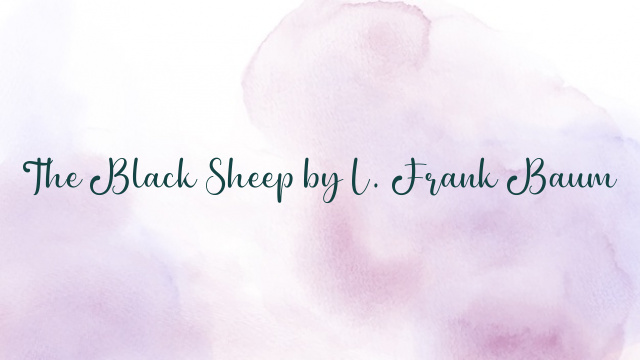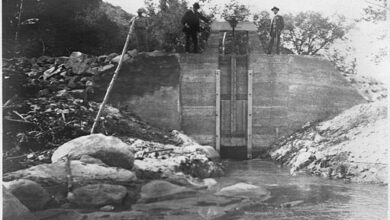
The Black Sheep by L. Frank Baum
Published in L. Frank Baum’s first children’s book, Mother Goose in Prose (1897),
Black sheep, black sheep, have you any wool?
Yes, my little master, three bags full;
One for my master and one for his dame,
And one for the little boy that lives in the lane.
It was a bright spring day, and the sun shone very warm and pleasant over the pastures, where the new grass was growing so juicy and tender that all the sheep thought they had never tasted anything so delicious.
The sheep had had a strange experience that morning, for the farmer had taken them down to the brook and washed them, and then he tied their legs together and laid them on the grass and clipped all the heavy, soft wool from their bodies with a great pair of shears.
The sheep did not like this very well, for every once in a while the shears would pull the wool and hurt them; and when they were sheared they felt very strange, for it was almost as if someone took off all your clothes and let you run around naked. None of them were in a very good temper this morning, although the sun shone so warmly and the grass was so sweet, and as they watched the farmer and his man carry their wool up to the house in great bags, the old ram said, crossly,
“I hope they are satisfied, now that they have stolen from us all our soft, warm fleece.”
“What are they going to do with it?” asked one of the sheep.
“Oh, they will spin it into threads and make coats for the men and dresses for the women. For men are such strange creatures that no wool grows on them at all, and that is why they selfishly rob us of our fleece that they may cover their own skinny bodies!”
“It must be horrid to be a man,” said the Black Sheep, “and not to have any wool grow on you at all. I’m sorry for that little boy that lives in the lane, for he will never be able to keep warm unless we give him some of our wool.”
“But what a shame it is,” continued the ram, “for the farmer to steal all the wool from us when we have taken all the trouble to grow it!”
“I don’t mind,” bleated a young lamb named Frisky, as it kicked up its heels and gambolled about upon the grass; “it’s nice to have all that heavy wool cut off my back, for I sha’ n’t have to carry it around wherever I go.”
“Oh, indeed!” sneered the ram, “you like it, do you? Have you any idea what you look like, all sheared down to your skin? How would you like to have someone come along and see you, now that you are all head and legs?”
“Oh, I wouldn’t mind,” said the lamb again; “I shall grow more wool by wintertime, and I’m sure I don’t look any worse than you do.”
Some of the sheep looked at the ram and began to titter, for he was old and thin, and looked very comical indeed without any wool. And this made him so angry that he went off by himself and began eating grass, and would not speak to the others at all.
“I don’t know why sheep should feel badly about having their fleeces cut,” remarked the Black Sheep, thoughtfully, “for the farmer is very kind to us, and so is his dame, and I am glad my wool serves to keep them warm in the winter. For before the snow comes our wool will grow out again, and we shall not be any the worse for our loss.”
“What do those people who haven’t any sheep do for clothes?” asked the lamb.
“I’m sure I don’t know. They must nearly freeze in the winter. Perhaps the ram can tell us.”
But the ram was still angry, and refused to say anything, so the sheep stopped talking and began to scatter over the pasture and eat the tender, new grass.
By and by the Black Sheep wandered near the lane, and looking up, saw the little boy watching it through the bars.
“Good morning, Black Sheep,” said the boy; “why do you look so funny this morning?”
“They have cut off my wool,” answered the sheep.
“What will they do with it, Black Sheep?” enquired the little boy.
“They will make coats of it, to keep themselves warm.”
“I wish I had some wool,” said the boy,” for I need a new coat very badly, and mamma is so poor she cannot buy me one.”
“That is too bad,” replied the Black Sheep; “but I shall have more wool by and by, and then I will give you a bagful to make a new coat from.”
“Will you really?” asked the boy, looking very much pleased.
“Indeed I will,” answered the sheep, “for you are always kind and have a pleasant word for me. So you watch until my wool grows again, and then you shall have your share of it.”
“Oh, thank you!” said the boy, and he ran away to tell his mother what the Black Sheep had said.
When the farmer came into the field again the Black Sheep said to him, “Master, how many bags of wool did you cut from my back?”
“Two bags full,” replied the farmer; “and it was very nice wool indeed.”
“If I grow three bags full the next time, may I have one bag for myself?” asked the sheep.
“Why, what could you do with a bag of wool?” questioned the farmer.
“I want to give it to the little boy that lives in the lane. He is very poor and needs a new coat.”
“Very well,” answered the master; “if you can grow three bags full I will give one to the little boy.”
So the Black Sheep began to grow wool, and tried in every way to grow the finest and heaviest fleece in all the flock. She always lay in the sunniest part of the pastures, and drank from the clearest part of the brook, and ate only the young and juicy shoots of grass and the tenderest of the sheep-sorrel. And each day the little boy came to the bars and looked at the sheep and enquired how the wool was growing.
“I am getting along finely,” the Black Sheep would answer, “for not one sheep in the pasture has so much wool as I have grown already.”
“Can I do anything to help you?” asked the little boy.
“Not that I think of,” replied the sheep, “unless you could get me a little salt. I believe salt helps the wool to grow.”
So the boy ran to the house and begged his mother for a handful of salt, and then he came back to the bars, where the Black Sheep licked it out of his hand.
Day by day the wool on the sheep grew longer and longer, and even the old ram noticed it and said, “You are foolish to grow so much wool, for the farmer will cut it all off, and it will do you no good. Now I am growing just as little as possible, for since he steals what I have I am determined he shall get very little wool from my back.”
The Black Sheep did not reply to this, for she thought the old ram very ill-tempered and selfish, and believed he was doing wrong not to grow more wool. Finally the time came to shear the sheep again, and the farmer and his man came into the pasture to look at them, and were surprised to see what a fine, big fleece the Black Sheep had grown.
“There will be three bagsful at the least,” said the master, “and I will keep my promise and give one to the little boy in the lane. But, my goodness! how scraggly and poor the old ram looks. There is scarcely any wool on him at all. I think I must sell him to the butcher!”
And, in truth, although the ram kicked and struggled and bleated with rage, they tied his legs and put him into the cart and carried him away to the butcher. And that was the last the sheep ever saw of him.
But the Black Sheep ran up to the bars by the lane and waited with a glad heart till the little boy came. When he saw the sheep waiting for him he asked,
“Black Sheep, Black Sheep, have you any wool?”
And the sheep replied,
“Yes my little master, three bags full!”
“That is fine!” said the boy; “but who are the three bags for?”
“One for my master, one for his dame, And one for the little boy that lives in the lane.”
“Thank you, Black Sheep,” said the little boy; “you are very kind, and I shall always think of you when I wear my new coat.”
The next day the sheep were all sheared, and the Black Sheep’s fleece made three big bagsful. The farmer kept his promise and carried one bag to the little boy that lived in the lane, and the wool was so soft and so heavy that there was enough not only for the new coat, but to make his mother a warm dress as well.
The Black Sheep was very proud and happy when the mother and her little boy came down to the bars and showed the new clothes that had been made from the wool.
“This pays me for all my trouble,” said the Black Sheep, and the little boy reached his hand through the bars and patted her gently upon the head.




